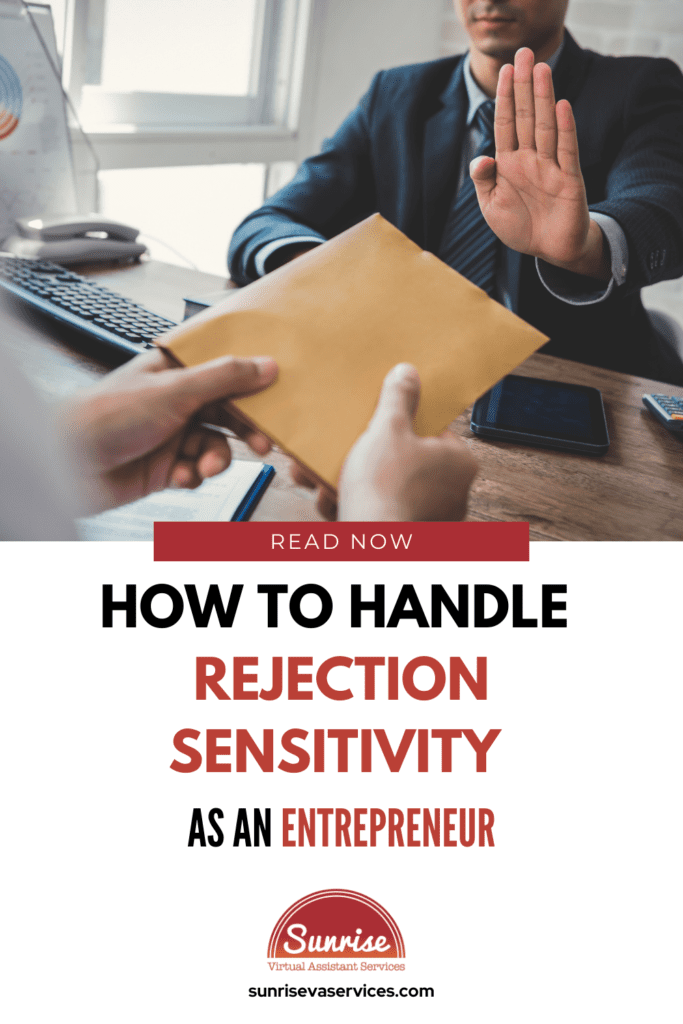Rejection sensitivity as an entrepreneur can feel like a hurdle that’s hard to overcome, especially when every pitch, proposal, or sales call feels personal.
For neurodivergent individuals, particularly those with rejection sensitivity dysphoria (RSD), the emotional sting of perceived rejection or negative feedback can disrupt not only their work but also their emotional state. The business world is inherently filled with highs and lows, and learning how to handle rejection is one of the most important things you can do to create resilience and long-term success.
Whether you’re an ADHD entrepreneur, a female business owner, or simply someone navigating the twists and turns of running your own business, managing rejection with grace and confidence is essential.
Here’s how you can strategically turn sensitive moments into strengths while balancing your mental well-being.
Understanding Rejection Sensitivity Dysphoria
Rejection sensitivity dysphoria (RSD) is a common symptom of ADHD and anxiety disorders, yet a lot of people don’t realize how profoundly it can impact their professional lives.
Dr. William Dodson, who is a leading expert in ADHD, describes RSD as “extreme emotional sensitivity” that arises in response to perceived rejection, criticism, or even perceived failure.
This condition isn’t just about being overly sensitive—it’s rooted in the nervous system, making the emotional reactions deeply intense and sometimes overwhelming.
For entrepreneurs, especially women entrepreneurs and neurodivergent individuals, rejection can hit harder than it does for the average person. An official diagnosis isn’t always necessary to recognize the signs.
Many who struggle with rejection sensitivity notice they experience rejection more emotionally than others, especially in challenging environments that require constant social interaction like sales calls or interpersonal relationships.
Why Rejection Feels So Personal for Entrepreneurs
No one likes being rejected; especially if you’re pursuing something dreams are made of.
Entrepreneurs pour a lot of time, energy, and passion into their businesses, making rejection feel deeply personal.
Rejection can trigger an intense emotional response, whether it’s a declined pitch, a harsh social media comment, or lukewarm results from a campaign.
Female entrepreneurs, in particular, often face unique challenges due to societal expectations and biases. When combined with tendencies like perfectionism, rejection can feel like a confirmation of underlying fears of failure or inadequacy.
But here’s the truth – experiencing rejection is a common experience in any business owner’s life. The most important thing is not avoiding rejection but learning how to respond in a way that allows you to move forward while preserving your emotional well-being.
Strategies to Manage Rejection Sensitivity as an Entrepreneur
- Recognize and Name the Emotion
The first step to addressing rejection sensitivity is awareness. Take a moment to identify your reaction—are you feeling angry, disappointed, or sad? This ability to label your intense emotions is part of emotional regulation.
Why this works: Naming your feelings helps you create a “pattern interrupt” in your thought processes, preventing your initial emotional reactions from spiraling out of control.
- Practice Mindfulness Techniques
Mindfulness techniques, such as deep breaths and relaxation techniques, can help stabilize your nervous system in the face of rejection. These small yet powerful practices act as a reset, bringing your emotional responses back to baseline.
Why this works: If mindfulness feels new or overwhelming, start with as little as two minutes a day. Apps or guided YouTube videos can go a long way in making mindfulness a habit.
- Engage in Strategic Planning
Rejection is often a step toward refinement, whether in sales conversations or broader business strategies. Use a strategic planning approach to evaluate what you can learn from each no. Was your pitch clear? Was your product aligned with the target audience’s needs?
Why this works: Asking powerful questions will help uncover patterns and opportunities for improvement.
- Set Healthy Boundaries
Time limits on sales calls or responding to social situations can prevent prolonged emotional strain. Protecting your mental bandwidth allows you to process rejection without it consuming critical parts of your business or personal life.
Why this works: For example, if a sales call doesn’t go the way you hoped, rather than spiraling into low self-esteem, schedule a break or focus on something enjoyable to balance your emotional state.
- Lean on Support Systems
One of the best ways to manage high rejection sensitivity is by building a safe space for support. Whether this means hiring an ADHD business coach, joining a community of neurodivergent entrepreneurs, or working with mental health professionals, having people to mentor women or guide neurodivergent individuals makes a profound impact.
Diann Wingert, host of the Driven Woman podcast, often emphasizes the importance of creating a “no-BS approach” to building resilience. Connecting with a mentor or productivity coach can provide perspective and actionable advice to help you move forward with greater ease.
- Reframe Rejection as Redirection
The business world is full of trial and error. Each “no” brings you closer to the right “yes.” Think of rejection not as failure but rather as redirection toward better opportunities or strategic growth.
For instance, if a revenue goal isn’t met this month, it doesn’t reflect your overall worth or competency. Use the experience to fine-tune your strategy and push forward next week.
Addressing Rejection Sensitivity Dysphoria in the Work Environment
Rejection sensitivity dysphoria can manifest as a fear of rejection, fear of failure, or heightened emotional sensitivity. For entrepreneurs juggling multiple roles, this can interfere with productivity and cloud judgment.
One way to tackle this challenge is by improving your interpersonal relationships within the work environment. Communicating clearly with your team, setting boundaries, and celebrating small wins together can all contribute to a healthier dynamic.
It’s also essential to manage executive functions, such as memory loss and emotional regulation, which may be affected by ADHD or rejection sensitivity. Personal systems like time-blocking your day, using task lists, or leveraging tools like Outwrite for content creation can help alleviate stress and free up mental energy.
Finding Inspiration in Others
Hearing from others who’ve faced similar challenges is invaluable. Look for podcast episodes, YouTube videos, or blogs today that share personal stories about overcoming rejection sensitivity in entrepreneurial settings.
Whether it’s Diann Wingert or a fellow neurodivergent entrepreneur, you’ll find valuable insights and strategies to apply to your business.
The Power of Resilience
Handling rejection sensitivity as a neurodivergent entrepreneur means operating outside your comfort zone and accepting that rejection is part of emotional dysregulation for a lot of neurodivergent people. It’s not a sign of weakness but a shared experience that you can manage with the right tools and support.
Practice kindness towards yourself, stay curious about what rejection can teach you, and don’t hesitate to seek mentorship or connect with a safe community of like-minded people. Remember, the hardest part is often the first step, and every effort you make to handle rejection with grace will lead you closer to your goals.
If you’re ready to explore more best practices for managing rejection and building resilience, check out 10 Positive Affirmations for Rejection Sensitivity now. You deserve to thrive in your own business—on your own terms.


